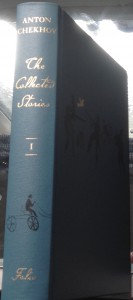 Just finished re-reading Vol I of my favourite short story writer, Anton Chekhov, beautifully produced in a four volume illustrated collection by The Folio Society, London. My favourites in this book are The Steppe and Gusev, but particularly Gusev which was written in 1890.
Just finished re-reading Vol I of my favourite short story writer, Anton Chekhov, beautifully produced in a four volume illustrated collection by The Folio Society, London. My favourites in this book are The Steppe and Gusev, but particularly Gusev which was written in 1890.
It is set in the sick bay of a ship returning to Russia from the Far East. The main characters are Gusev, a discharged soldier who is delirious and dreams of going home but is dying from tuberculosis, and Paul Ivanovich, a soldier and a proud member of the revolutionary intelligentsia. Both men will die and Gusev accepts his fate but Ivanovich rails against society and injustice and comes off with some powerful lines:
“Yes, I never mince my words, I fear nothing and no one – there’s a vast difference between me and you [Gusev] in this respect. You’re a blind, benighted, downtrodden lot. You see nothing – and what you do see you don’t understand. People tell you the wind’s broken loose from its chain – that you’re cattle, savages. And you believe them. They punch you on the neck – and you kiss their hand. Some animal in a racoon coat robs you, then tips you fifteen copecks – and, ‘Oh, let me kiss your hand, sir,’ you say. You’re pariahs, you’re a pathetic lot, but me – that’s another matter. I live a conscious life, and I see everything as an eagle or hawk sees it, soaring above the earth. I understand it all. I am protest incarnate. If I see tyranny, I protest. If I see a canting hypocrite, I protest. If I see swine triumphant, I protest. I can’t be put down, no Spanish Inquisition can silence me. No sir. Cut out my tongue and I’ll protest in mime. Wall me up in a cellar and I’ll shout so loud, I’ll be heard a mile off. Or, I’ll starve myself to death, and leave that extra weight on their black consciences. Kill me – my ghost will still haunt you. ‘You’re quite insufferable, Paul Ivanovich’ – so say all who know me, and I glory in that reputation. I’ve served three years in the Far East, and I’ll be remembered there for a century. I’ve had rows with everyone. ‘Don’t come back,’ my friends write from European Russia. So I damn well will come back and show them, indeed I will. That’s life, the way I see it – that’s what I call living.”

